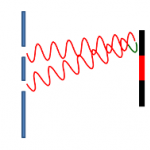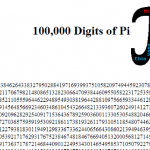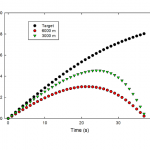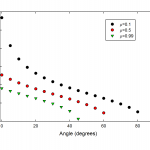Pop Culture
No, this isn't another blog post lamenting the fact that music writing gets far more attention than science writing. If anything, it's a bit of an argument that science writing ought to be less like popular music writing.
On Twitter this past weekend Jim Henley, one of the few bloggers I consider "old school" (the name of this blog was influenced by his Unqualified Offerings, though he's mostly stepped back from that) had a long series of tweets about pop-music writing, responding to some arguments that music criticism has degenerated and hardly has anything to do with music any more. Jim…
We took a week off last week because Rhett was away on a Secret Mission, but we're back and better than ever this week. More uncertain! More dotty! Or something!
Topics for this week include oblique references to Rhett's mission, some discussion of the Geocentric Janeway debacle, good and bad places to have a conference, why you shouldn't eat conference center food, why more physicists aren't on Twitter, and blogger gatherings.
Here's a link to the Stealth Creationists and Illinois Nazis story I alluded to. It's from 2007, after the blogging dinosaurs but before the blogging armored sloths.
Another Monday, another recap of a new episode of the Cosmos reboot. This one was all about optics, and much of it was excellent. This was in part due to the fact that its first couple of historical segments focused on non-Western figures, and I don't know as much about their background to be able to nitpick. First up was Mozi, a Chinese philosopher from circa 400BCE, who may have been the first to demonstrate the camera obscura technique of projecting images from a pinhole in the wall of a dark room. He was followed by ibn al-Haytham, circa 1000CE, who did the first fairly complete analysis…
The fourth episode of the Cosmos reboot aired last night, and as I said on Twitter it was a beautiful demonstration of why I'm finding this show intensely frustrating. There were flashes of brilliance, but also quite a few bits that left me shaking my head. Thus fitting the pattern of the previous episodes-- I didn't comment on last week's, because I was taking a break, but it had the same sorts of issues, too-- so I guess that's just what this show is.
Again, there was some very good stuff-- the opening framing device with William Herschel talking about ghosts was great, and Tyson's tour…
"Daddy? How do you make water?"
"You mean, what is it made of?"
"Yeah, what's water made of?"
"Hydrogen and oxygen."
"Oh. And what's hydrogen and oxygen?"
"They're chemical elements."
"So, when we drink water, we're drinking chemicals?"
"Well, yeah. In a sense, everything is chemicals. Water's a chemical, air is made of chemicals. "
"What about, like, wood?"
"Chemicals."
"What?!?! Is everything chemicals?"
"Pretty much, yeah."
"What about lights?"
"Light isn't a chemical, but the things that make light are made out of chemicals."
"Yeah, like, the Sun is fire, and it makes light, but is the…
This week's Cosmos was all about the evolution of life, and was viewed by millions of people outside of Oklahoma, where they presumably got an hour-long local news promo, or analysis of the Oklahoma State's chances in the NCAA Tournament. As such, it was a bit outside my area of expertise, but that never stopped a blogger before...
There were a couple of things about this that I thought were great, and two things that bothered me. The episode opened with a very nice discussion of the history of dogs and humans, demonstrating how dramatically untold generations of human selection have modified…
Today is March 14th, 3/14 in the normal American way of writing dates, so you'll find a lot of silliness on the web today talking about "π Day" due to the coincidental similarity with the first three digits of π (see, for example, Rhett's annual post). But, of course, this is an archaic and local convention, and not really suited to the dignity of science.
After all, the defined SI unit of time is the second, so if you're going to do things properly, you really ought to measure time in seconds (like the Qeng Ho in Vernor Vinge's brilliant A Deepness in the Sky). So, a proper celebration of…
"So, that's the science show with space pictures. What did you think of it, honey?"
"Science. Space pictures. Awesome!"
Our umpteenth winter storm of the season delayed school two hours this morning, which is kind of the worst of all possible worlds from a parenting perspective-- when the schools are closed, there's (usually) a snow-day day-care program, but they don't take kids during a mere delay. On the bright side, though, it gave me a chance to show SteelyKid the Cosmos reboot from Sunday night. Her capsule review is at the top.
In a little more detail:
-- I asked her if she wanted to…
So, last week I idly wondered about the canonical falling-bomb whistle. The was originally intended to be a very short post just asking the question, but I got caught up in thinking about it, and it ended up being more substantial. And leaving room for further investigation in the form of, you guessed it, VPython simulations.
This one isn't terribly visual, so you don't get screen shots, just a link to the code at Gist. It's a simulation of a falling bomb, with air resistance, tracking the velocity as a function of time. Then it calculates a "Doppler shift" using the velocity as a fraction of…
I alluded to this on Twitter, and meant to leave that be, but the other thing I was going to blog today didn't come together, and I probably shouldn't leave a cryptic tweet as my only comment. So...
One of the links getting passed around a lot in my social-media circles is this Tumblr post from Ben Lillie on The Humanities of Science Communication, which argues that discussions of the science of communication often seem to ignore the expertise of people who communicate for a living-- playwrights, actors, journalists, etc. This is a good point, but the post as a whole bugged me a bit, because…
In which Rhett and I talk about Cosmos. What, you thought there would be another topic? We have contractual obligations, you know...
Okay, there were some other topics like Battlestar Galactica (both versions), why so much of what's on Discovery Channel and TLC sucks these days, the flawed astrophysics of Firefly, speculation about how those little infrared thermometers work, and why some kinds of labs are hard.
And Cosmos again. Because, really, how could we not?
It says here in the fine print that my blogging license could be revoked if I fail to offer a public opinion on the Cosmos reboot, which premiered last night. I missed the first couple of minutes-- I had The Pip for bedtime, and he didn't start snoring until 8:58-- but saw most of it in real time. I posted a bit of commentary on Twitter, but will offer something marginally less ephemeral here.
The show opened and closed with tributes to Carl Sagan, and Neil deGrasse Tyson standing on the same cliff where Sagan opened the original series back in 1980. That was good and fitting, and Tyson's…
Not that long ago, SteelyKid was doing something violent with toys (she's very tough, as you can see from the featured image above), and in the process made the canonical falling-bomb whistle noise. And it occurred to me to wonder, why that sound?
I mean, I've seen footage of falling bombs and the canonical sound seems like an accurate enough. But I'm not sure I understand it from a physics perspective. Specifically, when you do the falling-bomb whistle, you do a whistle that decreases in pitch. But the bomb is falling faster as it approaches the ground, so if anything, I would expect the…
Given the academic circles I run in, it's not surprising that one of the most repeated stories crossing my social media feeds yesterday had to do with the changes to the SAT. Starting in 2015, the essay section will no longer be mandatory, and they're going to reconfigure the reading and math sections to emphasize different categories of questions.
My slightly cynical take on this is that changes seem to be driven more by marketing than education-- stories about this all mention that the changes make the new SAT more like the ACT, which has been gaining in popularity in recent years. Which…
In October 1988, I trashed my parents' basement in order to get into college.
OK, the causal connection is a little indirect, but it's there. I was applying to college that fall, and needed to write an essay to go with my application. I've always been able to write stuff with very little effort, so I banged out something that I thought was adequate, and showed it to my guidance counselor, who said "No way." My parents backed her up on this, and I had to go write another one.
The problem was that while what I had written was reasonably polished, it was also glib and superficial-- because I'm…
I got book edits this week, gave an exam on Thursday, and pre-registration for our spring term classes is just beginning, so I have a parade of students begging to get into this course or that one to deal with. So I have no more time for detailed blogging, but will do a bit of tab-clearing to end the week.
This piece about bimodal exams resonated well with my experiences in intro classes. I see a lot of the same thing, though with less statistical power, given that our maximum class size is 18. But in general, the "well-prepared students are bored, poorly-prepared students hopelessly lost"…
I'm running errands today, so here's a quick post picking up a question from last week's Olympic physics hangout: What sport involves the least physics?
One of the kids in the classes we were video chatting with asked that, and I really like the question, though it was a struggle to answer. It's one of those questions that will ultimately be like an excessively-zoomed-in data graph-- whatever the answer, everything starts with a pretty high baseline of physics content, just because there's physics in everything.
For the Winter Olympics, my original suggestion was ski jumping, thinking it was…
I spent a while on Friday morning talking about the physics of the Olympics with a couple of science classes in Tennessee and Lawrence Norris from the National Society of Black Physicists, organized by Adam "@2footgiraffe" Taylor. This was done via a Google hangout, so the video is recorded on YouTube:
The recording seems to have mostly remained on my video feed, which is a little unfortunate. Lawrence didn't have a camera, though, so he's a disembodied voice. I liked the first question-- "What Olympic event involves the least physics?"-- though it's a tricky one to answer.
Anyway, it was a…
In the previous post about luge, I mentioned that there was one thing that came up when Rhett and I were talking about this, namely why there are differences in times between racers. The toy physics model I set up last time suggests that the difference between riders is only a matter of aerodynamics-- two riders with the same mass and cross-sectional area ought to achieve the same speed. So why do they all get different times?
Well, if the sleds and other gear were all identical and locked into tracks, then mass and aerodynamics would be the entire story. But they're not-- the rules allow for…
The outrage of the moment in academic circles is this Nick Kristof column on how academics need to be more engaged with a broader public. And it's really impressive how he manages to take an idea that I basically agree with-- I regularly give talks on the need for scientists to do more outreach via social media-- and present it in a way that's faintly insulting.
This came to my attention via Chuck Pearson on Twitter, who also has a long blog response. There are also good responses from Edward Carr and Corey Robin, and the hashtag Chuck launched, #EngagedAcademics includes lots of counter-…






